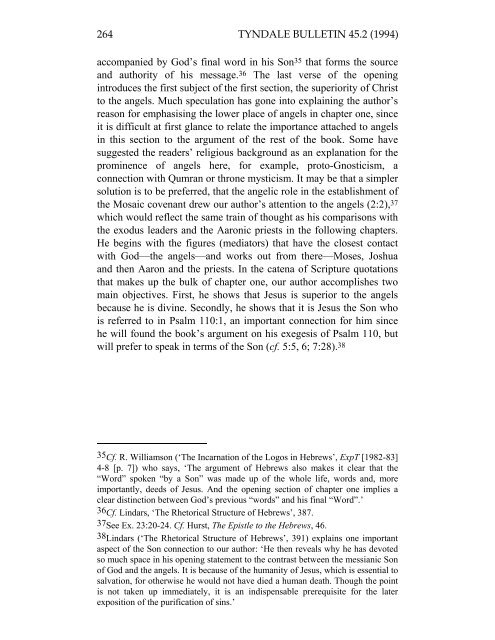the structure of hebrews from three perspectives - Tyndale House
the structure of hebrews from three perspectives - Tyndale House
the structure of hebrews from three perspectives - Tyndale House
Create successful ePaper yourself
Turn your PDF publications into a flip-book with our unique Google optimized e-Paper software.
264 TYNDALE BULLETIN 45.2 (1994)<br />
accompanied by God’s final word in his Son 35 that forms <strong>the</strong> source<br />
and authority <strong>of</strong> his message. 36 The last verse <strong>of</strong> <strong>the</strong> opening<br />
introduces <strong>the</strong> first subject <strong>of</strong> <strong>the</strong> first section, <strong>the</strong> superiority <strong>of</strong> Christ<br />
to <strong>the</strong> angels. Much speculation has gone into explaining <strong>the</strong> author’s<br />
reason for emphasising <strong>the</strong> lower place <strong>of</strong> angels in chapter one, since<br />
it is difficult at first glance to relate <strong>the</strong> importance attached to angels<br />
in this section to <strong>the</strong> argument <strong>of</strong> <strong>the</strong> rest <strong>of</strong> <strong>the</strong> book. Some have<br />
suggested <strong>the</strong> readers’ religious background as an explanation for <strong>the</strong><br />
prominence <strong>of</strong> angels here, for example, proto-Gnosticism, a<br />
connection with Qumran or throne mysticism. It may be that a simpler<br />
solution is to be preferred, that <strong>the</strong> angelic role in <strong>the</strong> establishment <strong>of</strong><br />
<strong>the</strong> Mosaic covenant drew our author’s attention to <strong>the</strong> angels (2:2), 37<br />
which would reflect <strong>the</strong> same train <strong>of</strong> thought as his comparisons with<br />
<strong>the</strong> exodus leaders and <strong>the</strong> Aaronic priests in <strong>the</strong> following chapters.<br />
He begins with <strong>the</strong> figures (mediators) that have <strong>the</strong> closest contact<br />
with God—<strong>the</strong> angels—and works out <strong>from</strong> <strong>the</strong>re—Moses, Joshua<br />
and <strong>the</strong>n Aaron and <strong>the</strong> priests. In <strong>the</strong> catena <strong>of</strong> Scripture quotations<br />
that makes up <strong>the</strong> bulk <strong>of</strong> chapter one, our author accomplishes two<br />
main objectives. First, he shows that Jesus is superior to <strong>the</strong> angels<br />
because he is divine. Secondly, he shows that it is Jesus <strong>the</strong> Son who<br />
is referred to in Psalm 110:1, an important connection for him since<br />
he will found <strong>the</strong> book’s argument on his exegesis <strong>of</strong> Psalm 110, but<br />
will prefer to speak in terms <strong>of</strong> <strong>the</strong> Son (cf. 5:5, 6; 7:28). 38<br />
35Cf. R. Williamson (‘The Incarnation <strong>of</strong> <strong>the</strong> Logos in Hebrews’, ExpT [1982-83]<br />
4-8 [p. 7]) who says, ‘The argument <strong>of</strong> Hebrews also makes it clear that <strong>the</strong><br />
“Word” spoken “by a Son” was made up <strong>of</strong> <strong>the</strong> whole life, words and, more<br />
importantly, deeds <strong>of</strong> Jesus. And <strong>the</strong> opening section <strong>of</strong> chapter one implies a<br />
clear distinction between God’s previous “words” and his final “Word”.’<br />
36Cf. Lindars, ‘The Rhetorical Structure <strong>of</strong> Hebrews’, 387.<br />
37See Ex. 23:20-24. Cf. Hurst, The Epistle to <strong>the</strong> Hebrews, 46.<br />
38Lindars (‘The Rhetorical Structure <strong>of</strong> Hebrews’, 391) explains one important<br />
aspect <strong>of</strong> <strong>the</strong> Son connection to our author: ‘He <strong>the</strong>n reveals why he has devoted<br />
so much space in his opening statement to <strong>the</strong> contrast between <strong>the</strong> messianic Son<br />
<strong>of</strong> God and <strong>the</strong> angels. It is because <strong>of</strong> <strong>the</strong> humanity <strong>of</strong> Jesus, which is essential to<br />
salvation, for o<strong>the</strong>rwise he would not have died a human death. Though <strong>the</strong> point<br />
is not taken up immediately, it is an indispensable prerequisite for <strong>the</strong> later<br />
exposition <strong>of</strong> <strong>the</strong> purification <strong>of</strong> sins.’
















